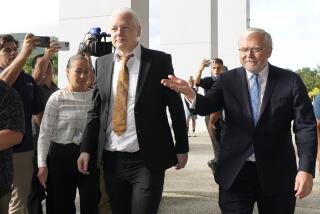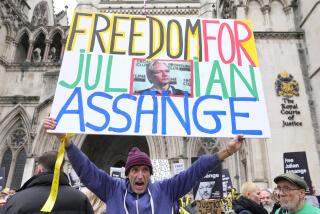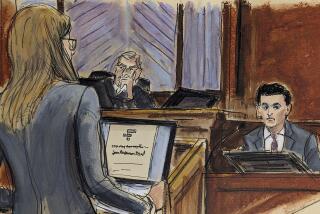Accused WikiLeaks source has first court appearance
- Share via
Reporting from Ft. Meade, Md. — Appearing in a military courtroom Friday for the first time, accused WikiLeaks source Army Pfc. Bradley Manning said he understood the charges against him in a criminal case that involves one of the largest leaks of classified material in U.S. history.
The pretrial proceeding got bogged down in legal maneuvering when Manning’s civilian lawyer, David Coombs, argued that the presiding military officer could not be impartial because he is also a federal prosecutor.
Coombs said Army Reserve Lt. Col. Paul Almanza should step aside because he is the deputy chief prosecutor of the child exploitation and obscenity section of the criminal division of the Department of Justice.
“A reasonable person looking from the outside would say clearly the investigating officer is biased,” Coombs said.
Almanza acknowledged sending emails about the case from his Justice Department account earlier this week. He said he had no contact, however, with federal prosecutors who are conducting a separate grand jury investigation of WikiLeaks founder Julian Assange.
After calling a recess to consider the defense request, Almanza declined to recuse himself. He also denied a defense motion to suspend the hearing until an appeals court could review his decision.
The Justice Department is investigating whether Assange played a role when Manning allegedly downloaded more than half a million classified U.S. military and diplomatic documents to his personal computer. Many of the documents were later posted on the WikiLeaks website.
The hearing comes as Britain’s Supreme Court agreed to hear an unrelated appeal from Assange, who is seeking to block extradition to Sweden on sexual assault charges. The London court scheduled a two-day hearing starting Feb. 1.
Assange, an Australian, has denied the charges and says the case is politically motivated. He has been under house arrest since December 2010.
In a statement released by the New York-based Center for Constitutional Rights, Assange said that if Manning was indeed the source of classified materials on WikiLeaks, he contributed “to the ending of dictatorships and exposing torture and wrongdoing all over the world.”
Manning was a low-level Army intelligence officer in Iraq when he was arrested in May 2010. He is charged with aiding the enemy, transmitting national defense information in violation of the Espionage Act, and other charges. He has pleaded not guilty.
On Friday, when Manning entered the court at Ft. Meade, he kept his eyes down and did not acknowledge the roughly 50 people on oak benches behind him. He wore camouflage fatigues, dark-rimmed glasses and a patch from his unit, the 10th Mountain Division.
Sitting by his lawyers, he fidgeted with his pen and took notes. He was attentive and polite when Almanza asked if he was aware of the charges against him, answering, “Yes, sir.”
Manning has an international following of fans who view him as a whistle-blower who exposed U.S. misdeeds. Moments after the hearing ended, a man in the courtroom gallery yelled, “Bradley Manning, you’re a hero!”
About 35 other supporters rallied outside the gates of the military base to denounce the hearing and what they say was abusive treatment of Manning in prison. Some held signs saying “Free Bradley Manning” and “Expose the lies.”
In the military justice system, a pretrial Article 32 hearing allows defense lawyers to challenge the government’s evidence. At its conclusion, the presiding officer makes a recommendation on whether sufficient evidence exists to convene a full court-martial.
More to Read
Sign up for Essential California
The most important California stories and recommendations in your inbox every morning.
You may occasionally receive promotional content from the Los Angeles Times.











